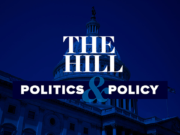This piece originally appeared in AZCentral on January 24, 2023.
Your free speech rights became much less secure after the passage of Proposition 211 last year.
The new law harms your right to join others to form groups to press for government reform. With the law’s forced disclosure of names and addresses, fewer will want to join such groups and lend their voice to important social issues.
Those who think the status quo is just fine probably welcome these changes. The rest of us should worry. So it’s a good thing that the Goldwater Institute recently filed a lawsuit challenging the measure, saying it violates Arizonans’ constitutional rights to free speech and assembly.
Sure, transparency sounds good. And transparency for the government is a good idea. Yet there are very good reasons to protect your privacy and that of all Arizonans. Many people want to keep their advocacy on policy issues private, especially in an era of extreme political division.
Consider a person who supports a group with just over a $200 a month contribution over two years working either for or against abortion rights in Arizona. The new law requires disclosure of this person’s name and address.
With real threats and violence against many people involved in the abortion issue, publicity that can lead to harassment or violence is a high price to pay to advocate for their cause. Many won’t donate as a result.
Consider that only 10 years ago many people would have hesitated before sending money to an LGBTQ rights group if their name and address had to be publicly revealed. Mandated public disclosure of supporters’ names, addresses, and employment information will lead some nonprofits not to speak out on issues core to their mission.
When transparency is for the government, it can be a good thing – our job as citizens is to watch those in power. But when invasive disclosure mandates harm Arizonans for exercising their free speech rights, so-called “transparency” becomes a weapon to silence participation in the democratic process.
Proposition 211 was marketed as a way to provide Arizonans with accurate information, but its “original source” disclosure requirements force groups to publish misleading information. In some instances, the law’s mandates will inaccurately link contributors to speech they don’t support.
Imagine you give money to your local chamber of commerce because you support its general advocacy for jobs and economic growth. That group then gives money to a pro-business group who uses some of that money to oppose a state bill that would raise business taxes.
The local chamber also gives money to a pro-innovation group that spends some of that money supporting a ballot measure that, among other things, raises taxes to provide funding for companies to meet innovation targets. According to disclosure records, you could appear to both support and oppose raising taxes on business.
Political campaigns and political action committees already must disclose their spending and donors. This initiative instead targets nonprofit groups speaking on issues of public concern and likely will misleadingly label groups and their members as “opposing” or “supporting” candidates.
Additionally, Proposition 211 imposes burdensome and unclear reporting requirements on nonprofit organizations to track, classify and disclose spending. Many small nonprofit organizations focused on immigration, climate change, school choice and health care advocacy would have to divert their scarce resources to catalog this kind of information, and many will accidentally file incorrect information.
The added responsibility of tracking and research will inevitably increase the cost for organizations to speak on critical issues.
The United States Supreme Court has repeatedly recognized that the First Amendment protects the right to privately associate and struck down laws that have unreasonably compromised privacy and speech. Now that Proposition 211 has passed, Arizonans seeking to exercise fundamental rights are getting their day in court.
Both the U.S. Constitution and the Arizona Constitution demand protection for free expression of privacy. It’s now time to uphold these constitutional rights.














